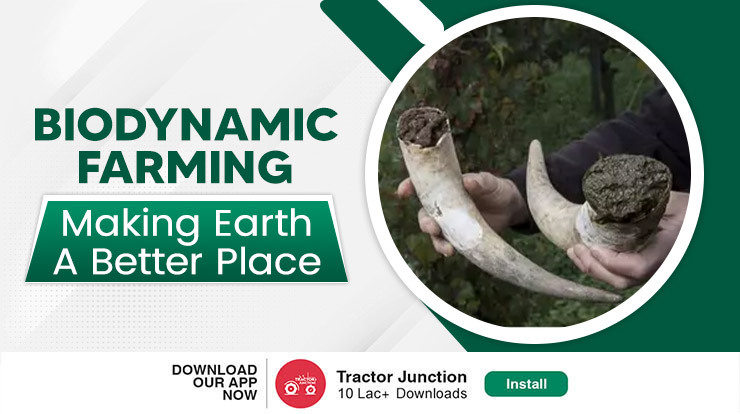
Biodynamic farming is a technique of crop production based on astronomical activities such as lunar cycles and also easy availability of locally-sourced materials. Moreover, this farming technique prohibits the use of chemicals and external mediums for crop production. However, there is a misconception that biodynamic and organic farming may seem identical, but there are lots of differences between the both.
Rudolf Steiner introduced this farming method in 1924, one of the first approaches toward sustainable farming. Furthermore, biodynamic agriculture aims to retain soil health and grow crops with the help of diverse microbial life on that specific land. Although this farming technique is based on survival with the available resources, we still need living soil for properly conducting this farming. Living soil is a piece of land with an indulgence of biological diversity, including bacteria, fungi, protozoa and many other microbes. Thus, a biodynamic farm is considered a living being and has specific needs for its survival. Apart from this, Biodynamic food is considered a healthy choice instead of those chemically grown crops.
Principles of Biodynamic farming:-

Below are the principles which define biodynamic farming’s importance and its functioning.
Crop Rotation For Better Soil
Crop rotation helps restore the soil nutrients as growing different crops will require different nutrients, ensuring that there will be no shortage of any particular nutrient.
Promoting Animal Husbandry
Animal husbandry helps a lot for the well-being of soil in biodynamic farming. It especially reuses waste products of cattle and other farm animals, which diminishes the use of artificial materials in the field.
Composting To Rejuvenate Land
Composting is another method essential for biodynamic farming, and this technique is helpful for healthy plant growth by decomposing organic matter and food waste.
Using The Forces Of Nature
As we have already discussed, biodynamic farming depends on available resources. Moreover, these forces are based on the earth’s rotation, solar activity or other factors. Apart from this, nature’s forces include gravity and electromagnetism, which helps the plants to nurture at a deeper level. Although this factor may seem superstitious in farming, it has a lot of prominences. Thus, the force of nature has a vital role in the proper functioning of living soil.
Requirements For Biodynamic farming:-
This farming technique does not have many requirements; instead, it restricts using chemical fertilisers, pesticides or other synthetic matter. So, let’s dive into the need for Biodynamic farming, which replenishes the soil nutrients.
No Chemical Uses

The theme of no-chemical use immensely defines biodynamic farming. Moreover, this farming technique prohibits using any chemicals or foreign matter. Thus, the plants are grown with the help of available biological factors.
Necessity Of Diversified Living Soil

The living soil is required for the growth of plants in the absence of artificial materials. However, living soil is very nutritious on its own due to the variety of living organisms present in it. Furthermore, plants and organisms help each other by providing the necessary nutrients.
Planting According To Cosmic Activities

This may seem a bit far-fetched, but planting any crop according to a specific cosmic activity can result in a higher yield. Also, a variety of plants are preferred to be grown on a particular lunar activity day. In addition, there is a biodynamic farming calendar prepared by analysing astronomical happenings to achieve the best quality crops.
So, people are moving towards Biodynamic gardening due to its easier accessibility. Moreover, this agriculture is also called biological farming as it has biotic factors for production.
Frequently Asked Questions on Biodynamic Farming
Que. What is biodynamic farming?
Ans. It is a nature-based farming technique which relies on locally-sourced materials and living soil for crop production.
Que. What is the difference between biodynamic farming & organic agriculture?
Ans. Organic farming allows using natural fertilisers and foreign materials, whereas Biodynamic farming restricts us from doing so.
Que. What does biodynamic mean?
Ans. Biodynamic farming determines cultivation with a holistic approach and no-chemical use.
Que. Why is biodynamics good?
Ans. It helps to rejuvenate the soil nutrients and produce high-quality crops making land sustainable.
Que. Is biodynamic better than organic?
Ans. Both types of farming have their advantages, but biodynamic agriculture is slightly more beneficial for nature. However, the organic farming basics are similar to biodynamic.
Que. How is biodynamic farming sustainable?
Ans. Biodynamic farming is helpful for nature as it produces significantly less waste.
Que. What are the advantages of biodynamic farming?
Ans. It helps maintain the balance between plants and microbial life on earth as both are essential for each other’s survival. Thus, it is also called regenerative biodynamic farming.
Que. How is biodynamic different from organic?
Ans. People compare Biodynamic v/s Organic farming, but both are different due to the zero chemical use in biodynamic farms
Conclusion
The above mentioned article explains the need of adapting biodynamic farming and how it proves beneficial for our planet. Apart from this, the new age farming technique will also save the natural resources for our future generations. Thus, Biodynamic farming is a smart choice for efficient production. Stay connected with us to know more about different types of farming.
Related Blog
What is Urban Farming in India
Pineapple Farming in India
What is Contour Farming and its Benefits


